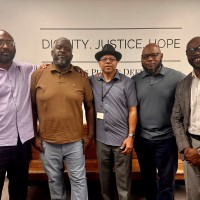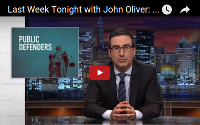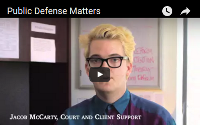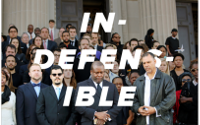Collectively, they spent 155 years in prison. Now they counsel other people facing their own long sentences. A conversation with five peer advocates at the New Orleans public defender's office.
The Redeem Team
By Radley Balko
From left: Michael Banford, Everett Offray, Terry Pierce, Louis Gibson, and Robert Jones.
March 15, 2025 - Of the five men who serve as “peer advocates” for the Orleans Parish Public Defender, only one — Robert Jones — is an exonoree. He was released in 2016 after the BBC uncovered evidence of his innocence. He had been convicted of a rape and robbery spree in the French Quarter that culminated in the killing of a British tourist. Jones now serves as director of community outreach for the office.
Another of the five, Terry Pierce, says he was acting in self-defense when he shot and killed a man in 1980. The other three — Michael Banford, Everett Offray, and Louis Gibson — do not claim that they were innocent.
While Jones was 19 at the time of the alleged crime, the other four men were convicted for murders committed when they were juveniles. All four were sentenced to life without parole, and all four were were among the hundreds of prisoners released after a series of Supreme Court decisions limiting when states can impose life sentences on minors, but before the more conservative Trump-era court began to narrow those decisions.
The peer advocate advocate is a relatively new position that you’ll primarily find in holistic public defender offices. The idea is to have formerly incarcerated people serve as counselors, advisors, and mentors to clients facing serious criminal charges. Their job is to build trust and facilitate communication between the accused and their legal team. Their responsibilities might include advising clients considering plea bargains, helping people recently released adjust to reentry, and preparing clients and their families for prison after a conviction.
I interviewed these five men last month while visiting public defender offices around the country as research my forthcoming book, The Defenders.
I wanted to share the interview now because we’re currently in the midst of a broad backlash against criminal justice reform, rehabilitation, and the very notion of empathy.
I also wanted to share it because I found these guys inspiring. They’re living proof that rehabilitation is real, that people really do age out of crime, and that, as Bryan Stevenson famously put it, we’re all so much more than the worst thing we’ve ever done.
I’ve edited the interview for clarity and length.
For the full interview, click here for Radley Balko's substack, The Watch.





